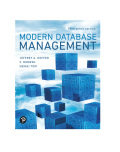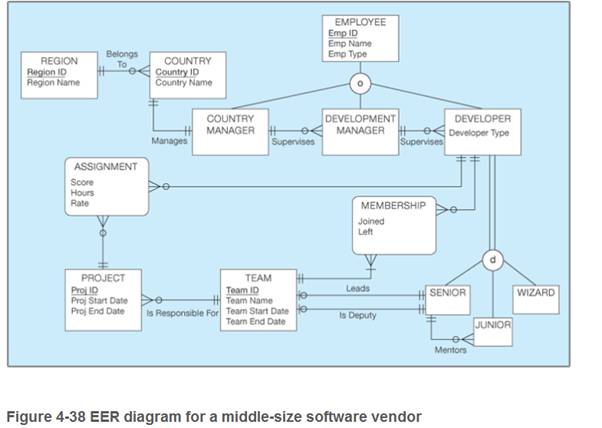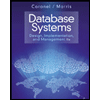
Modern Database Management
13th Edition
ISBN: 9780134792293
Author: Hoffer
Publisher: PEARSON
expand_more
expand_more
format_list_bulleted
Concept explainers
Textbook Question
Chapter 4, Problem 4.48PAE
Figure 4-38 includes an EER diagram for a medium-size software vendor. Transform the diagram into a relational schema that shows referential integrity constraints (see Figure 4-5 for an example of such a schema). In addition, verify that the resulting relations are in 3NF.

Expert Solution & Answer
Want to see the full answer?
Check out a sample textbook solution
Students have asked these similar questions
3. Problem Description: Define the Circle2D class that contains:
Two double data fields named x and y that specify the center of the circle with get
methods.
• A data field radius with a get method.
•
A no-arg constructor that creates a default circle with (0, 0) for (x, y) and 1 for radius.
•
A constructor that creates a circle with the specified x, y, and radius.
•
A method getArea() that returns the area of the circle.
•
A method getPerimeter() that returns the perimeter of the circle.
•
•
•
A method contains(double x, double y) that returns true if the specified point (x, y) is inside
this circle. See Figure (a).
A method contains(Circle2D circle) that returns true if the specified circle is inside this
circle. See Figure (b).
A method overlaps (Circle2D circle) that returns true if the specified circle overlaps with this
circle. See the figure below.
р
O
со
(a)
(b)
(c)<
Figure (a) A point is inside the circle. (b) A circle is inside another circle.
(c) A circle overlaps another…
1. Explain in detail with examples each of the following fundamental security design principles: economy of mechanism, fail-safe default, complete mediation, open design, separation of privilege, least privilege, least common mechanism, psychological acceptability, isolation, encapsulation, modularity, layering, and least astonishment.
Security in general means the protection of an asset. In the context of computer and network security, explore and explain what assets must be protected within an online university. What the threats are to the security of these assets, and what countermeasures are available to mitigate and protect the organization from such threats. For each of the assets you identify, assign an impact level (low, moderate, or high) for the loss of confidentiality, availability, and integrity. Justify your answers.
Chapter 4 Solutions
Modern Database Management
Ch. 4 - Define each of the following terms: determinant...Ch. 4 - Prob. 4.2RQCh. 4 - Prob. 4.3RQCh. 4 - Describe the primary differences between the...Ch. 4 - Summarize six important properties of relations.Ch. 4 - Describe two properties that each candidate key...Ch. 4 - Describe the three types of anomalies that can...Ch. 4 - Demonstrate each of the anomaly types with an...Ch. 4 - Fill in the blanks in each of the following...Ch. 4 - What is a well-structured relation? Why are...
Ch. 4 - Prob. 4.11RQCh. 4 - Describe how the following components of an E-R...Ch. 4 - Prob. 4.13RQCh. 4 - Prob. 4.14RQCh. 4 - Briefly describe four typical problems that often...Ch. 4 - Prob. 4.16RQCh. 4 - Explain how each of the following types of...Ch. 4 - Prob. 4.18RQCh. 4 - Prob. 4.19RQCh. 4 - Prob. 4.20RQCh. 4 - Prob. 4.21RQCh. 4 - What is the relationship between the primary key...Ch. 4 - Prob. 4.23RQCh. 4 - Explain what can be done with primary keys to...Ch. 4 - Prob. 4.25RQCh. 4 - Explain three conditions that suggest a surrogate...Ch. 4 - Prob. 4.27RQCh. 4 - For each of the following E-R diagrams from...Ch. 4 - Prob. 4.29PAECh. 4 - Prob. 4.30PAECh. 4 - For your answers to the following Problems and...Ch. 4 - Figure 4-3212 shows a class list for Millennium...Ch. 4 - Prob. 4.33PAECh. 4 - Prob. 4.34PAECh. 4 - Prob. 4.35PAECh. 4 - Prob. 4.36PAECh. 4 - Prob. 4.37PAECh. 4 - Prob. 4.38PAECh. 4 - Prob. 4.39PAECh. 4 - Transform Figure 2-15a, attribute version, to 3NF...Ch. 4 - The Public Safety office at Millennium College...Ch. 4 - Prob. 4.42PAECh. 4 - Prob. 4.43PAECh. 4 - Prob. 4.44PAECh. 4 - For your answers to Problem and Exercise 3-33 from...Ch. 4 - Prob. 4.46PAECh. 4 - Prob. 4.47PAECh. 4 - Figure 4-38 includes an EER diagram for a...Ch. 4 - Prob. 4.49PAECh. 4 - Prob. 4.50PAECh. 4 - Prob. 4.51PAECh. 4 - Prob. 4.52PAECh. 4 - Figure 4-40 shows an EER diagram for a university...Ch. 4 - Explore the data included in Table 4-9. Assume...Ch. 4 - Prob. 4.55PAECh. 4 - Prob. 4.56PAECh. 4 - Prob. 4.57PAECh. 4 - Prob. 4.58PAE
Knowledge Booster
Learn more about
Need a deep-dive on the concept behind this application? Look no further. Learn more about this topic, computer-science and related others by exploring similar questions and additional content below.Similar questions
- Please include comments and docs comments on the program. The two other classes are Attraction and Entertainment.arrow_forwardObject-Oriented Programming In this separate files. ent, you'll need to build and run a small Zoo in Lennoxville. All classes must be created in Animal (5) First, start by building a class that describes an Animal at a Zoo. It should have one private instance variable for the name of the animal, and one for its hunger status (fed or hungry). Add methods for setting and getting the hunger satus variable, along with a getter for the name. Consider how these should be named for code clarity. For instance, using a method called hungry () to make the animal hungry could be used as a setter for the hunger field. The same logic could be applied to when it's being fed: public void feed () { this.fed = true; Furthermore, the getter for the fed variable could be named is Fed as it is more descriptive about what it answers when compared to get Fed. Keep this technique in mind for future class designs. Zoo (10) Now we have the animals designed and ready for building a little Zoo! Build a class…arrow_forward1.[30 pts] Answer the following questions: a. [10 pts] Write a Boolean equation in sum-of-products canonical form for the truth table shown below: A B C Y 0 0 0 1 0 0 1 0 0 1 0 0 0 1 1 0 1 0 0 1 1 0 1 0 1 1 0 1 1 1 1 0 a. [10 pts] Minimize the Boolean equation you obtained in (a). b. [10 pts] Implement, using Logisim, the simplified logic circuit. Include an image of the circuit in your report. 2. [20 pts] Student A B will enjoy his picnic on sunny days that have no ants. He will also enjoy his picnic any day he sees a hummingbird, as well as on days where there are ants and ladybugs. a. Write a Boolean equation for his enjoyment (E) in terms of sun (S), ants (A), hummingbirds (H), and ladybugs (L). b. Implement in Logisim, the logic circuit of E function. Use the Circuit Analysis tool in Logisim to view the expression, include an image of the expression generated by Logisim in your report. 3.[20 pts] Find the minimum equivalent circuit for the one shown below (show your work): DAB C…arrow_forward
- When using functions in python, it allows us tto create procedural abstractioons in our programs. What are 5 major benefits of using a procedural abstraction in python?arrow_forwardFind the error, assume data is a string and all variables have been declared. for ch in data: if ch.isupper: num_upper = num_upper + 1 if ch.islower: num_lower = num_lower + 1 if ch.isdigit: num_digits = num_digits + 1 if ch.isspace: num_space = num_space + 1arrow_forwardFind the Error: date_string = input('Enter a date in the format mm/dd/yyyy: ') date_list = date_string.split('-') month_num = int(date_list[0]) day = date_list[1] year = date_list[2] month_name = month_list[month_num - 1] long_date = month_name + ' ' + day + ', ' + year print(long_date)arrow_forward
- Find the Error: full_name = input ('Enter your full name: ') name = split(full_name) for string in name: print(string[0].upper(), sep='', end='') print('.', sep=' ', end='')arrow_forwardPlease show the code for the Tikz figure of the complex plane and the curve C. Also, mark all singularities of the integrand.arrow_forward11. Go to the Webinars worksheet. DeShawn wants to determine the number of webinars the company can hold on Tuesdays and Thursdays to make the highest weekly profit without interfering with consultations, which are also scheduled for Tuesdays and Thursdays and use the same resources. Use Solver to find this information as follows: a. Use Total weekly profit as the objective cell in the Solver model, with the goal of determining the maximum value for that cell. b. Use the number of Tuesday and Thursday sessions for the five programs as the changing variable cells. c. Determine and enter the constraints based on the information provided in Table 3. d. Use Simplex LP as the solving method to find a global optimal solution. e. Save the Solver model below the Maximum weekly profit model label. f. Solve the model, keeping the Solver solution. Table 3: Solver Constraints Constraint Cell or Range Each webinar is scheduled at least once on Tuesday and once on Thursday B4:F5 Each Tuesday and…arrow_forward
- Go to the Webinars DeShawn wants to determine the number of webinars the company can hold on Tuesdays and Thursdays to make the highest weekly profit without interfering with consultations, which are also scheduled for Tuesdays and Thursdays and use the same resources. Use Solver to find this information as follows: Use Total weekly profit as the objective cell in the Solver model, with the goal of determining the maximum value for that cell. Use the number of Tuesday and Thursday sessions for the five programs as the changing variable cells. Determine and enter the constraints based on the information provided in Table 3. Use Simplex LP as the solving method to find a global optimal solution. Save the Solver model below the Maximum weekly profit model label. Solve the model, keeping the Solver solution. Table 3: Solver Constraints Constraint Cell or Range Each webinar is scheduled at least once on Tuesday and once on Thursday B4:F5 Each Tuesday and Thursday…arrow_forwardI want to ask someone who has experiences in writing physics based simulation software. For context I am building a game engine, and want to implement physics simulation. There are a few approaches that I managed to find, but would like to know what are other approaches to doing physics simulation entry points from scenes, would you be able to visually draw me a few approaches (like 3 approaces)? When I say entry point to the actual physics simulation. An example of this is when the user presses the play button in the editor, it starts and initiates the physics system. Applying all of the global physics settings parameters that gets applied to that scene. Here is the use-case, I am looking for. If you have two scenes, and select scene 1. You press the play button. The physics simulation starts. When that physics simulation starts, you are also having to update the physics through some physics dedicated delta time because physics needs to happen faster update frequency. To elaborate,…arrow_forwardI want to ask someone who has experiences in writing physics based simulation software. For context I am building a game engine, and want to implement physics simulation. There are a few approaches that I managed to find, but would like to know what are other approaches to doing physics simulation entry points from scenes, would you be able to visually draw me a few approaches (like 3 approaces)?When I say entry point to the actual physics simulation. An example of this is when the user presses the play button in the editor, it starts and initiates the physics system. Applying all of the global physics settings parameters that gets applied to that scene.Here is the use-case, I am looking for. If you have two scenes, and select scene 1. You press the play button. The physics simulation starts. When that physics simulation starts, you are also having to update the physics through some physics dedicated delta time because physics needs to happen faster update frequency.To elaborate, what…arrow_forward
arrow_back_ios
SEE MORE QUESTIONS
arrow_forward_ios
Recommended textbooks for you
 Database Systems: Design, Implementation, & Manag...Computer ScienceISBN:9781305627482Author:Carlos Coronel, Steven MorrisPublisher:Cengage Learning
Database Systems: Design, Implementation, & Manag...Computer ScienceISBN:9781305627482Author:Carlos Coronel, Steven MorrisPublisher:Cengage Learning Database Systems: Design, Implementation, & Manag...Computer ScienceISBN:9781285196145Author:Steven, Steven Morris, Carlos Coronel, Carlos, Coronel, Carlos; Morris, Carlos Coronel and Steven Morris, Carlos Coronel; Steven Morris, Steven Morris; Carlos CoronelPublisher:Cengage Learning
Database Systems: Design, Implementation, & Manag...Computer ScienceISBN:9781285196145Author:Steven, Steven Morris, Carlos Coronel, Carlos, Coronel, Carlos; Morris, Carlos Coronel and Steven Morris, Carlos Coronel; Steven Morris, Steven Morris; Carlos CoronelPublisher:Cengage Learning A Guide to SQLComputer ScienceISBN:9781111527273Author:Philip J. PrattPublisher:Course Technology Ptr
A Guide to SQLComputer ScienceISBN:9781111527273Author:Philip J. PrattPublisher:Course Technology Ptr Fundamentals of Information SystemsComputer ScienceISBN:9781337097536Author:Ralph Stair, George ReynoldsPublisher:Cengage Learning
Fundamentals of Information SystemsComputer ScienceISBN:9781337097536Author:Ralph Stair, George ReynoldsPublisher:Cengage Learning Principles of Information Systems (MindTap Course...Computer ScienceISBN:9781285867168Author:Ralph Stair, George ReynoldsPublisher:Cengage Learning
Principles of Information Systems (MindTap Course...Computer ScienceISBN:9781285867168Author:Ralph Stair, George ReynoldsPublisher:Cengage Learning Principles of Information Systems (MindTap Course...Computer ScienceISBN:9781305971776Author:Ralph Stair, George ReynoldsPublisher:Cengage Learning
Principles of Information Systems (MindTap Course...Computer ScienceISBN:9781305971776Author:Ralph Stair, George ReynoldsPublisher:Cengage Learning

Database Systems: Design, Implementation, & Manag...
Computer Science
ISBN:9781305627482
Author:Carlos Coronel, Steven Morris
Publisher:Cengage Learning

Database Systems: Design, Implementation, & Manag...
Computer Science
ISBN:9781285196145
Author:Steven, Steven Morris, Carlos Coronel, Carlos, Coronel, Carlos; Morris, Carlos Coronel and Steven Morris, Carlos Coronel; Steven Morris, Steven Morris; Carlos Coronel
Publisher:Cengage Learning

A Guide to SQL
Computer Science
ISBN:9781111527273
Author:Philip J. Pratt
Publisher:Course Technology Ptr

Fundamentals of Information Systems
Computer Science
ISBN:9781337097536
Author:Ralph Stair, George Reynolds
Publisher:Cengage Learning

Principles of Information Systems (MindTap Course...
Computer Science
ISBN:9781285867168
Author:Ralph Stair, George Reynolds
Publisher:Cengage Learning

Principles of Information Systems (MindTap Course...
Computer Science
ISBN:9781305971776
Author:Ralph Stair, George Reynolds
Publisher:Cengage Learning
Enhanced Entity Relationship Model; Author: Data Science Center;https://www.youtube.com/watch?v=ocQUtXPumdQ;License: Standard YouTube License, CC-BY